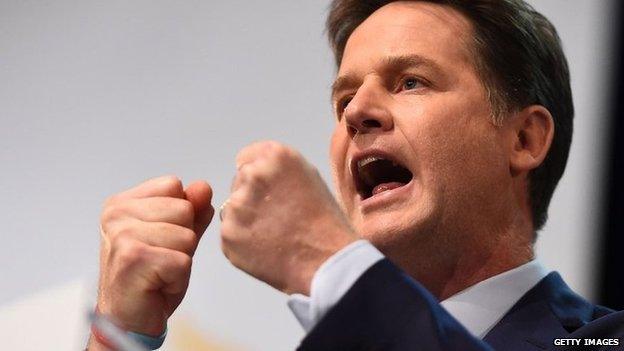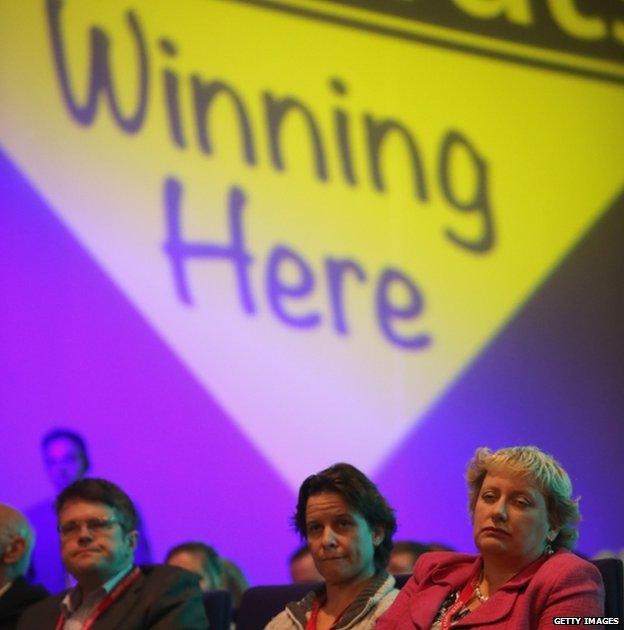Now what for the Liberal Democrats?
- Published

Nick Clegg has delivered his final conference speech before the general election. What do the Liberal Democrats do next?
Nick Clegg focused on opportunity: for voters - and the Lib Dems.
You might have expected a party languishing in the polls, months from an election, to panic.
Not here.
The Lib Dems think their rivals are drifting to the extremes, towards what Mr Clegg calls "the bitter tribalism of left and right".
Where UKIP embraced voters' rejection of professional politicians, Mr Clegg condemned what he called the "false comfort of grievance".
His concern may have been sincere, but there was an eye to the main political chance. Where the Lib Dems see the centre of politics vacated by others, they think they can fill the gap.
Moving on
They concede few voters now love their leader. Mr Clegg admitted his party was tainted by government, and by implication the broken promise on tuition fees.
His speech was a plea to be judged on everything else that he said they had achieved: pension reform, a higher income tax personal allowance, gay marriage.
Having made a famous apology for tuition fees, he promised never to make the same mistake again, and wanted the public to move on.
Many will not.
But for all that, this is a party that - for the most part - will happily be tainted anew by the trials of office.
As Mr Clegg condemned "pick-a-side" politics, he knew he might have to do just that.
Speculation about whether Lib Dems favour Labour or the Conservatives bores them. The voters will decide, they say.

The Lib Dems believe they can hold on to a core of MPs with strong local followings
In the meantime Mr Clegg argued he could restrain the worst instincts of his opponents: stopping Ed Miliband spending too much or David Cameron spending too little.
He cast himself as a guardian of decency, and opposition to his policies as the closing of ranks by vested interests.
But there was special scorn for the Conservatives with whom he has governed. Home Secretary Theresa May was "playing party politics" with national security. Michael Gove had raided school budgets for his own schemes. The Tory right were "frenzied".
Mr Clegg revealed details of Budget negotiations in an attempt to embarrass the chancellor.
And yet, after days of such attacks - and deliberate distancing from the Conservatives - he reminded his party that it could not have governed without Mr Cameron.
Further coalitions were likely in the future, he said.
Backlash
If some Lib Dems felt they had to hold their noses going into one government with the Tories, they may have to take mighty deep breaths after the election.
There were precious few hints about how a new coalition might be negotiated.
The party will fight for an important commitment to mental health funding and a yet higher income tax personal allowance.
The status of most of the Lib Dems' other ideas is unclear. They may die in a ditch to defend them, or the policies could prove disposable as a deal is struck to form another government.
The party's priorities will feature on the front page of its manifesto, but for now we don't know which pledges will make the cut.
The election is an ominous prospect for some Lib Dem candidates. What little money the party has will be spent carefully. Some will find themselves bereft of resources and support; cannon fodder perhaps in a Clegg backlash.
But if a core of MPs with strong local followings hold on - and they believe they can - Mr Clegg could still hold the balance of power.
That - and the proximity of an election - has helped keep discipline in Glasgow.
It will depend on how Mr Clegg fights, and the fortunes of his rivals, but if there's a fresh opportunity after the election, the Lib Dems will grab it.